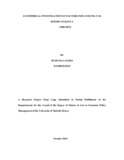| dc.description.abstract | Kenya’s fiscal arrangement indicates that government expenditure and its fiscal supply
side have maintained a consistent growth patterns with the expenditures always higher
than revenue supply. The differences between government expenditures and revenue
supply have led to increased budget deficits. Various tax reforms have been undertaken
but the fiscal deficit has not been reduced. A poor tax performance in terms of raising tax
can imply an inadequate tax effort on the side of the government which is influenced by
various factors. The main objective of the study was to identify the factors which
influence the tax effort in Kenya for the period 1980-2012. The study is of great
importance since an ability to identify these factors and their influence on tax effort is
paramount to the fiscal stability of the country. The study has used a model of tax effort
that was used by Islam (1979) in establishing the factors which influence tax effort in
Bangladesh. Annual time series data running from 1980 to 2012 has been used. The study
has used OLS method to estimate the long-run cointegrating equation. Pre-estimation
tests were carried out and using Breusch- Pagan test, the assumption of homoscedasticity
was violated. This was however corrected by use of robust standard errors. Using
Breusch- Godfrey LM test, serial autocorrelation was found to be absent. Using
Augmented Dickey Fuller (ADF) test variables used in the study were found to be
stationary. Normality of the error term was confirmed using Shapiro- Wilk test. The
estimated results show that tax effort in Kenya is influenced by the level of the size of
monetary base, foreign aid, tax reforms and per capita GDP. The main policy
implications derived from the study is that Kenya’s future direction of policy framework
lies on the above factors which influence tax effort and therefore necessary policies
should be formulated to influence their impacts. | en_US |

